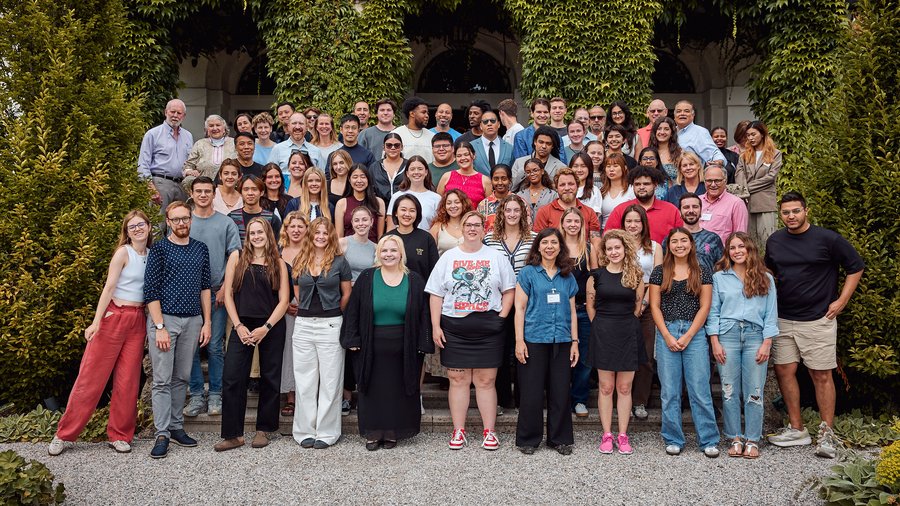19th Media Academy enables young creative minds to reinvent local media with compassion, care, and community
This summer, over 75 people from across the world gathered at Salzburg Global’s Schloss Leopoldskron for the 17th in-person and 19th Salzburg Academy on Media and Global Change. From July 14 to 30, 2025, the 48 session participants included undergraduate students, graduate students, doctoral students, postdoctoral researchers, and assistant professors. They were joined by 31 faculty members, including visiting guests, speakers, award-winning filmmakers, experts, and scholars. The global group, representing Thailand, Mexico, Hong Kong, the U.S., India, Argentina, Portugal, Austria, and many more countries, convened in Salzburg, Austria.
“Local Media Futures and Democratic Health” was the focus of this year’s Media Academy. Student leaders envisioned a world in which local media could bring people together in the face of global threats to democracy and the increasing digitalization of media landscapes.
Participants attended lectures taught by professors from institutions around the globe, workshops led by visiting experts, including Olesya Bida and Ryan Powell, and excursions to the UNESCO World Heritage site Gosausee and the Dokumentation Obersalzberg museum.
Participants also visited Paris Lodron Universität Salzburg (PLUS) for the second annual Shumow Symposium. The day-long experience honors the memory of late faculty member Moses Shumow, who believed in the power of dialogue to create positive change in the world. Faculty members from the hosting PLUS University gave the participants a tour of the historic libraries on campus. The day concluded with the Decolonizing Salzburg Tour, which grappled with the complex diversity, history, and culture of the city.
Reflecting on this year’s Salzburg Academy on Media and Global Change, faculty chair and program director Paul Mihailidis wrote, “This summer’s group brought a fierce commitment to each other, an engagement with the ideas we explored, and a diligence to grapple with some of the issues that face our global society. It's not lost on me how powerful communities can create lasting, transformational impact that's larger than any individual, any single idea, or any one viewpoint. The 2025 Media Academy cohort inspired us with laughter, love, and care.”
Participants spent over 20 hours working together in small groups on innovative projects. After researching communities that lack strong local media, they applied these learnings to real and fictional scenarios to discover how local media can create healthier democracies. The projects proposed solutions to media deserts, which are geographical locations that lack access to media.
On the final day of the Media Academy, the groups presented their projects to their peers and faculty members. The project outcomes include:
- The Case of Self-Built Media Deserts: The “Home Future Dialogue” holds 45-minute civic forums centered around social issues to get people more politically involved. The forums would travel around Germany and allow individuals to learn more online through a dedicated website.
- Laal Stadt: “The Vermelho Trust” is a non-profit organization in the fictional city of Laal Stadt that aims to foster open dialogue among people and end the media desert. The donation-based organization hosts public forums, publishes a magazine, and hosts its own radio show.
- Moontown Media Desert Revolution 3025: Moontown is a fictional world on the moon, 100 years from now. In the midst of a media desert, “The Dark Side” is an alternative news outlet that promotes community involvement and Indigenous values through publications, street art, digital campaigns, and community events.
- Alpia: Alpia is a fictional place made up of displaced individuals experiencing a media desert. “Sweet Unity” is a non-profit organization that utilizes educational programs to empower people in the region to manage and maintain their local media.
More details on the projects can be found in the cohort’s final publication, “Proximity, People, and Power,” published on the online platform Medium. It also features the group’s playlist, keynotes, reflections, and session highlights. The final projects will be published on the Salzburg Global website.
Helena Musielewicz, a student from the University of Texas at Austin, felt “grateful to have had the opportunity to attend Salzburg Global and meet so many intelligent people from all over the world. I was able to engage in meaningful dialogue and interact with cultures that I otherwise might never have even known about,” Helena said. “In the end, I learned a lot about myself, the world, and what I have the power to do with my career. My goals and dreams seem much closer to reach, and my hopes for the future of ethical journalism and media are bright.”
The Salzburg Academy on Media and Global Change is an annual program that convenes emerging leaders in media fields to build networks for positive change. If you would like to find out more about the Academy, please email Paul Mihailidis, Faculty Chair and Program Director.


